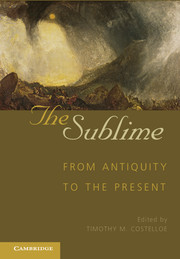Book contents
- Frontmatter
- Contents
- List of Illustrations
- Contributors
- Acknowledgments
- The Sublime
- Part One Philosophical History of the Sublime
- Part Two Disciplinary and other Perspectives
- 10 The First American Sublime
- 11 The Environmental Sublime
- 12 Religion and the Sublime
- 13 The British Romantic Sublime
- 14 The Sublime and the Fine Arts
- 15 Architecture and the Sublime
- Bibliography
- Index
- References
The Sublime
A Short Introduction to a Long History
Published online by Cambridge University Press: 05 January 2015
- Frontmatter
- Contents
- List of Illustrations
- Contributors
- Acknowledgments
- The Sublime
- Part One Philosophical History of the Sublime
- Part Two Disciplinary and other Perspectives
- 10 The First American Sublime
- 11 The Environmental Sublime
- 12 Religion and the Sublime
- 13 The British Romantic Sublime
- 14 The Sublime and the Fine Arts
- 15 Architecture and the Sublime
- Bibliography
- Index
- References
Summary
It is almost as fashionable in the history of philosophy to declare certain concepts dead and buried as it is, periodically at least, to announce the discipline itself to be at an “end.” “The sublime” seems to have undergone a similar fate in recent years, and one writer on the subject has even penned a “Farewell to the Sublime,” placing himself proudly in the company of other savants to declare, in their collective terminology, the sublime anemic, bourgeois, elitist, feeble, ideological, ineffective, irrelevant, irresponsible, nostalgic, poor, and weak – in a word, dead. Drawing on the concept, moreover, does not “do much philosophic work or result in much understanding,” readers are informed, and because the sublime is so clearly “damaged goods,” they might be willing to accept a “moratorium on the word” and replace it with others that are “fresh and exact.” This is bad news indeed and, one has to admit, comes as something of a surprise.
To what, however, is one here saying farewell? What could it mean to declare the sublime dead or, at best, as the preceding litany of adjectives suggests, enervated and decadent? Fortunately, declarations of demise have a poor track record in philosophy, even when they come from the likes of Kant, Hegel, and Wittgenstein, and moratoriums imposed on the free spirit of philosophical thought tend to have the same traction as King Canute commanding the tide to stop. Hyperbole aside, such declarations can refer only to some inadequacy in the philosophical concept of the sublime, rather than signaling the disappearance of the human experience to which the concept refers or in some way delineates. These are two distinct spheres, but they are effectively elided when “sublime” is treated, as its naysayers apparently do, generically: “What could it mean to define the sublime, once and for all, when it has changed so much since the first appearance of the word – later taken to be the same as the eighteenth-century sublime – in a classical text by Longinus?”
- Type
- Chapter
- Information
- The SublimeFrom Antiquity to the Present, pp. 1 - 8Publisher: Cambridge University PressPrint publication year: 2012
References
- 4
- Cited by

